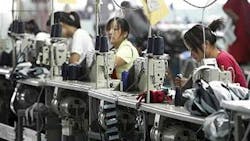China Annual Growth Hits 13-year Low, Industrial Production Up 10%
China's economy grew at its slowest pace in 13 years in 2012, the government said Friday, but an uptick in the final quarter pointed to better news ahead for a prime driver of the tepid global recovery.
Gross domestic product (GDP) in the world's second-largest economy expanded 7.8% last year in the face of weakness at home and in key overseas markets, the National Bureau of Statistics (NBS) announced.
But it grew 7.9% in the final three months of 2012 as industrial production and retail sales growth strengthened at the end of the year, snapping seven straight quarters of slowing growth in a positive sign for the spluttering world economy.
The official statistics come as optimism grows among analysts that China will pick up steam in 2013 after two years of relative weakness, although they -- and the government -- caution that the improvement will not be dramatic.
"The international economic environment remains complicated this year and ... there are still unbalanced conflicts in the Chinese economy," NBS spokesman Ma Jiantang told reporters.
Still, Ma added: "We expect China's economy to continue to grow in a stable manner in 2013."
The slowdown in annual growth was the second in a row and marked its lowest point since 1999, when it stood at 7.6%, according to official statistics.
China has had to contend with weakness in the global economy, particularly the key export markets of the United States and Europe, and as the government took steps to cool a once red hot property market.
But its growth rate remains the highest among leading economies. GDP reached 51.9 trillion yuan (US$8.28 trillion) in 2012, further cementing its position as the world's No. 2 economy behind the United States.
The GDP figures were just ahead of expectations, with economists surveyed by AFP having projected growth of 7.7% in 2012 and 7.8% in the fourth quarter, and anticipating acceleration to 8% this year.
Worst Likely Over
IHS Global Insight senior economist Ren Xianfang said the worst was probably over for China and while it had avoided a "hard landing," challenges remained as it entered a "new normal" of slower growth.
"The rebound by itself looks quite shaky," she wrote in a report after the data. "The trajectory of recovery is flat, mirroring the shallow downturn it's rebounding from."
Growth had slowed for seven straight quarters through September, when the economy expanded 7.4%, the worst since early 2009. Annual GDP grew 9.3% in 2011 and 10.4% in 2010.
Successfully managing the economy is a key concern for China's leaders, who derive much of their claims to legitimacy from the country's reform-led economic rise, which has lifted hundreds of millions of people out of poverty over the past three decades.
The government is due to formally conclude a once-in-a-decade power handover in March with Xi Jinping, already named Communist Party chief, becoming president and Li Keqiang taking over as premier in charge of day-to-day administration.
The country's economy is widely seen as having matured to the point where the growth model of the past, including public spending for big ticket infrastructure projects, must be modified.
Zhang Zhiwei, China economist for Nomura International in Hong Kong, told AFP: "The data showed that the recovery is on track, but in the meantime inflation is picking up.
Inflation Rising
"So monetary policy will likely be tightened this year, with no chances of cuts in banks' reserve requirements or interest rates. As a result, GDP growth may slow down in the second half of this year."
The statistics bureau also released other key indicators Friday.
Industrial production grew 10% in 2012, with retail sales, China's main gauge of consumer spending, increasing 14.3%.
Fixed-asset investment, a key measure of government spending on infrastructure, expanded 20.6% to 36.5 trillion yuan in the year -- equivalent to just over 70% of GDP.
Copyright Agence France-Presse, 2013
About the Author
Agence France-Presse
Copyright Agence France-Presse, 2002-2025. AFP text, photos, graphics and logos shall not be reproduced, published, broadcast, rewritten for broadcast or publication or redistributed directly or indirectly in any medium. AFP shall not be held liable for any delays, inaccuracies, errors or omissions in any AFP content, or for any actions taken in consequence.
